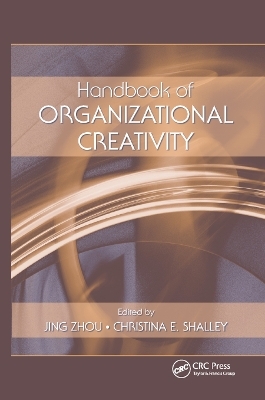
Handbook of Organizational Creativity
Psychology Press Ltd (Verlag)
978-0-367-86665-5 (ISBN)
provides a historical review of organizational creativity theory and research
presents critical reviews and summaries of research on micro, meso, and macro topics (e.g., leadership, feedback, goals and role expectations, groups and teams, social networks, climate and culture, deep structures, sense-making processes, and creativity and organizational change) concerning organizational creativity
demonstrates contributions of creativity to individual work outcomes and organizational success
discusses emerging areas and highlights promising future research trends.
Professors and graduate students in management and psychology will find this volume most beneficial. Professors and graduate students in marketing, sociology, and education also may find this book useful and relevant. Thoughtful managers and executives, professionals and knowledge workers, and aspiring managers and MBA students also would find this book beneficial in sharpening their thinking, and helping them to identify the right tools for managing creativity.
Jing Zhou is Professor of Management in the Jesse H. Jones Graduate School of Management at Rice University. Christina E. Shalley is GT Advance Professor in the College of Management at the Georgia Institute of Technology.
Section 1. Organizational Creativity in Historical Context. C. Shalley, J. Zhou, Organizational Creativity Research: An Historical Overview. T. Amabile, J. Mueller, Assessing Creativity and its Antecedents: An Exploration of the Componential Theory of Creativity. C. Ford, M. Kuenzi, Organizing Creativity Research: Insights and Proposals Suggested by Examining Classic Administrative Science Texts. Section 2. Distinctive Contributions from Organizational Creativity Research. P. Tierney, Leadership and Creativity: A Reciprocal Evolving Model. J. Zhou, Promoting Creativity through Feedback. C. Shalley, Creating Roles: What Managers Can Do to Establish Expectations for Creative Performance. P. Paulus, Fostering Creativity in Groups and Teams. J. Perry-Smith, When Being Social Facilitates Creativity: Social Networks and Creativity within Organizations. M. West, A. Richter, Climates and Cultures for Innovation and Creativity at Work. D. Dougherty, N. Tolboom, Creative Organizing to Enable Organizational Creativity: The Case of Sustained Product Innovation. R. Drazin, R. Kazanjian, M. Glynn, A Sensemaking Approach to Understanding the Politics of Creativity. R. Woodman, Creativity and Organizational Change: Linking Ideas and Extending Theory. Section 3. Normative Implications of Organizational Creativity Research. L. Gilson, Why be Creative: A Review of the Practical Outcomes Associated with Creativity at the Individual, Group, and Organizational Levels. A. Hargadon, Creativity that Works. Section 4. Suggestions for Future Organizational Creativity Research. J. Zhou, C. Shalley, Expanding the Scope and Impact of Organizational Creativity Research.
| Erscheinungsdatum | 24.12.2019 |
|---|---|
| Verlagsort | Hove |
| Sprache | englisch |
| Maße | 152 x 229 mm |
| Gewicht | 603 g |
| Themenwelt | Geisteswissenschaften ► Psychologie ► Allgemeine Psychologie |
| Geisteswissenschaften ► Psychologie ► Arbeits- und Organisationspsychologie | |
| ISBN-10 | 0-367-86665-X / 036786665X |
| ISBN-13 | 978-0-367-86665-5 / 9780367866655 |
| Zustand | Neuware |
| Haben Sie eine Frage zum Produkt? |
aus dem Bereich


